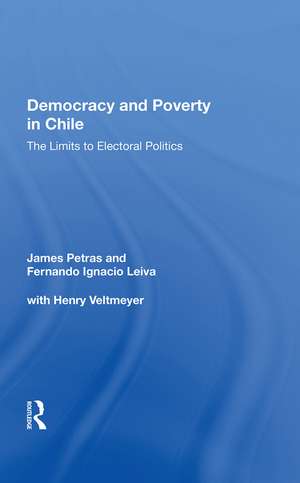Democracy And Poverty In Chile: The Limits To Electoral Politics
Autor James Petrasen Limba Engleză Hardback – 7 iun 2019
Preț: 764.20 lei
Preț vechi: 1102.79 lei
-31% Nou
Puncte Express: 1146
Preț estimativ în valută:
146.23€ • 159.34$ • 123.22£
146.23€ • 159.34$ • 123.22£
Carte tipărită la comandă
Livrare economică 23 aprilie-07 mai
Preluare comenzi: 021 569.72.76
Specificații
ISBN-13: 9780367016180
ISBN-10: 0367016184
Pagini: 232
Dimensiuni: 146 x 229 mm
Greutate: 0.45 kg
Ediția:1
Editura: Taylor & Francis
Colecția Routledge
Locul publicării:Oxford, United Kingdom
ISBN-10: 0367016184
Pagini: 232
Dimensiuni: 146 x 229 mm
Greutate: 0.45 kg
Ediția:1
Editura: Taylor & Francis
Colecția Routledge
Locul publicării:Oxford, United Kingdom
Cuprins
Introduction -- The Chilean Transition -- The Pinochet Regime -- From Critics to Celebrants -- Democracy and Poverty or the Poverty of Democracy? -- The Political Economy of the Aylwin Government -- Social Movements and Electoral Politics -- Limits to Aylwin’s “Growth with Equity” -- Conclusion -- Epilogue
Descriere
The critical issues concerning the development of a substantial and enduring democracy in Chile are those of strengthening civil society, democratizing the permanent institutions of the state, and building an economy geared to effectively satisfy human needs. In this book, the authors offer a critique of the Chilean transition and of the Aylwin electoral regime, analyzing the linkage between political compromises made prior to the civilians’ assumption of power and the choice of socioeconomic policy in the post-electoral period. They argue that the decisive factor underlying the Chilean transition is the contrast between the legal-political changes and socioeconomic and institutional continuities, a contrast that perpetuates the vast inequalities of wealth and power generated under Pinochet’s sixteen-year-old military dictatorship. They also challenge the myth of the “Chilean miracle‗the purported success of neoliberal policies in promoting sustained growth and social justice—and therefore in laying the basis for long-term social harmony and enduring political stability.
